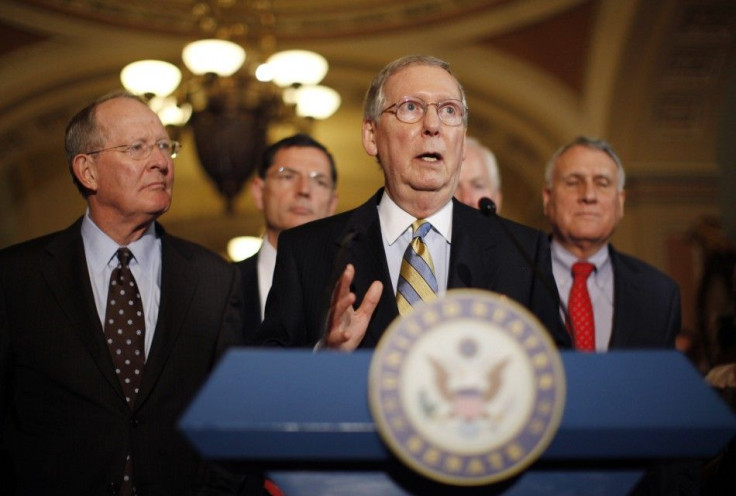McConnell Postpones Repeal Vote on Health Care Reform Until After 2012 Election

In a move that may have been done to preserve congressional Republicans reelection chances this November, Senate Minority Leader Mitch McConnell, R-Ky. reportedly said he wants to postpone a vote on repealing President Obama's healthcare reform law until after the election season.
While Republican senators are united in their disdain for Obama's signature legislative accomplishment, McConnell may scheduling a vote could give some Democrats an opportunity to vote for the law's repeal. A GOP senator who requested anonymity told The Hill that McConnell, during a private lunch meeting earlier this week, argued that forcing a vote could give provide political cover to some Democrats who may be facing a tough reelection bid.
[McConnell] said that we had a debate on it and everyone is on the record. He said some Democrats might vote for the amendment and it would give them cover in an election year, the senator said.
Moreover, the Senate Minority Leader is likely planning ahead for the future of his party. Republicans are anxious to take back the Senate, which -- if it manages to keep its majority in the House -- will give the GOP the leverage it needs to advance its own causes and stand firm against legislative efforts proposed by the Obama administration if the president is elected for a second term.
Backlash Against GOP Possible
Plus, the GOP could face a backlash from voters if it repeals some aspects of the law that have considerable public support.
While a USA Today/Gallup poll released earlier this week indicates that a majority of Americans question the constitutionality of the law's individual mandate, other surveys indicate that certain provisions of the law are popular across party lines.
An extensive Harris Interactive/HealthyDay poll released in January found that Americans seem to be increasingly are some key components of the legislation over time. Seventy-one percent of the more than 2,000 respondents said they approved of a rule that bars insurers from discriminating against individuals with pre-existing conditions, a seven point increase from November 2010. Other measures of the rule, such as one that provides tax credits to small businesses toward employee healthcare coverage as well as another that allow children to stay on their parents insurance plan until age 26, were also supported by a majority of respondents.
Still, the law's individual mandate -- which imposes a penalty on individuals who do not have insurance -- remains extremely unpopular. Only 19 percent of those polled supported it, regardless of party affiliated, a figure that has not budged since November 2010.
A Kaiser poll released in December predicted Americans could potentially be swayed on their opinion of the mandate. While only 33 percent of respondents initially said they supported the rule, opinions changed once the issue was framed in a different light.
When the respondents were told that people may wait until they're seriously ill to obtain healthcare coverage without the mandate, 47 percent of those polled said they supported it. A slightly larger group (49 percent) backed it when they were told insurers could potentially refuse to cover sick applicants without the mandate, and when told individuals would be exempted from the mandate if they prove the cost if they cost would consume too large a share of their income.
Approximately 47 million Americans currently do not have health insurance, according to White House estimates.
The U.S. Supreme Court will begin hearing arguments about the constitutionality of the healthcare law on March 26.
© Copyright IBTimes 2024. All rights reserved.











